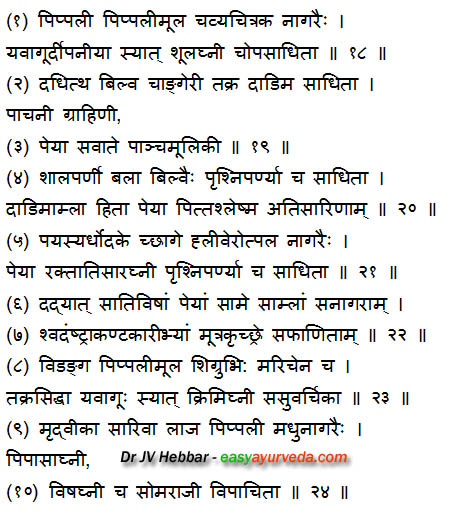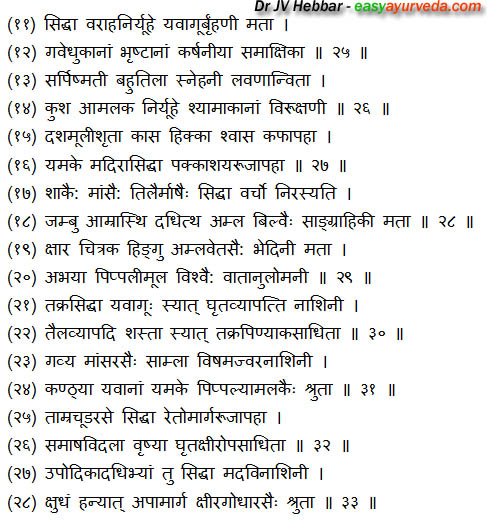Charaka Samhita Sutrasthana Chapter 2: Apamarga Tanduliya Adhyaya
The second chapter of Charak Samhita Sutrasthana is called Apamarga Tanduliya Adhyaya. Apamarga is an herb called Prickly Chaff Flower (Achyranthes Aspera Linn.). Tandula means its de-husked seeds. This chapter is named so, because it starts with the explanation of dehusked seeds of Apamarga.
We shall now expound the chapter on the dehusked seeds of Apamarga
Thus said Lord Atreya. [ 1-2 ]
Table of Contents
Herbs used For Nasya treatment
To treat diseases pertaining to head, ear, nose and throat –
In order to eliminate Doshas from the head in the event of heaviness of head, headache, rhinitis, hemicrania (single sided headache), infectious diseases of the head, epilepsy, insomnia and fainting, one should prescribe –
Seeds of Apamarga (Achyranthes Aspera Linn.),
Pippali (Piper longum Linn.),
Maricha – Long pepper (Piper nigrum Linn.),
Vidanga – False Black Pepper (Embelia ribes Burm. F. ),
Shigru – Moringa (Moringa oleifera Lam.),
Sarshapa (Brassica nigra Kotch) – Mustard,
Tumburu (Zanthoxylum alatum. Roxb.),
Ajaji (Cuminum cyminum Linn.)
Ajagandha (Gynandropsis gynandra Briquet),
Pilu (Salvadora persica Linn.),
Ela – cardamom (Elettaria Cardamomum Maton),
Harenuka (Pisum sativum Linn.),
Prithvika (Nigella Sativa Linn.),
Surasa – Holy Basil (Ocimum Sanctum Linn.),
Shveta Aparajita (Clitoria ternatea Linn. White variety),
Kutheraka (Ocimum basilibum Linn.),
Phanijjaka (?),
Seed of Sirisa (Albizia lebbeck Benth),
Lashuna – Garlic (Allium sativum Linn.),
Haridra – Turmeric (Curcuma longa Linn.),
Daruharidra (Berberis aristata Dc.),
Saindhava (Rock salt),
Sauvarcala (Sonchal salt),
Jyotishmati (Celastrus paniculatus Willd.) and
Nagara – ginger – (Zingiber officinale Rose.) [ 3-6 ]
Herbs used for Vamana (emesis) treatment
In the event of gastro-intestinal diseases caused by vitiated Kapha and Pitta, Vamana (emesis) therapy is advised. For this purpose, the physician should prescribe the below herbs to avoid injury to the body and to do emesis therapy safely.
Madana (Randia dumetorum Lam.),
Madhuka (Glycyrrhiza glabra Linn.),
Nimba (Azadirachta indica A. Juss.),
Jimuta (Luffa echinata Roxb.),
Kirtavedhana (Luffa acutangula Roxb.),
Pippali. (Piper longum Linn.),
Kutaja (Holarrhena antidysenterica Wall.)
Ikshvaku (Lagenaria siceraria Standl.),
Ela – cardamom (Elettaria cardamomum Maton.),
Dhamargava (Luffa cylindrica M. Roem.) [ 7-8 ]
Herbs for Virechana (purgation) Treatment
For purgation in the event of vitiated Doshas of the intestines, the physician should prescribe
Trivrit (Operculina turpethum R.B),
Haritaki (Terminalia chebula Linn.), Amalaki (Emblica officinalis Gaertn.), Bibhitaka (Terminalia bellerica Roxb.),
Danti (Baliospermum montanum Muell – Arg),
Neelini (Indigofera tinctoria Linn.),
Saptala (Acacia concinna Dc.),
Vacha (Acorus calamus Linn.),
Kampillaka (Mallotus philippinensis muell – Arg.),
Gavakshi (Citrullus colocynthis Schrad.),
Ksheerini (Mimusops hexandra Roxb.),
Udakeeryaka (Pongamia pinnata Merr.),
Peelu (Salvadora persica Linn.)
Aragvadha (Cassia fistula Linn.),
Draksha – raisins (Vitis vinifera Linn.)
Dravanti (Jatropha glandulifera Roxb.),
Nichula (Barringtonia acutangula Gaertn.). [9-10]
Herbs used for Asthapana, Anuvasana type of Basti
For Asthapana (a variety of enema with kashayam) in the event of Udavarta (bloating), Vibandha (constipation), one should prescribe
Patala (Stereospermum suaveolens DC.),
Agnimantha (Clerodendrum phlomidis Linn. F.),
Bilva (Aegle marmelos Ccrr.),
Shyonaka (Oroxylum indicum Vent.),
Kashmarya (Gmelina arborea Linn.),
Shalaparni (Desmodium gangeticum DC.),
Prishniparni (Uraria picta Desv.),
Nidigdhika (Solanum xanthocarpum Schrad.),
Bala (Sida cordifolia Linn.),
Svadamstra (Tribulus terrestris Linn.),
Brihati (Solanum indicum Linn.),
Eranda (Ricinus communis Linn.).
Punarnava (Boerhavia diffusa Linn.),
Yava – Barley (Hordeum vulgare Linn.),
Kulattha – Horse gram (Dolichos biflorus Linn.),
Kola (Zizyphus jujuba Lam.),
Guduchi (Tinspora cordifolia Miers.),
Madana – emetic nut (Randia dumetorum Lam.),
Palasha (Butea monosperma Kuntze),
Kattruna (Cymbopogon schoenanthus Spreng.),
fats and salts.
These drugs are also to be prescribed for Anuvasana (fat enema) for the cure of imbalanced Vata. Thus, the five elimination therapies (Panchakarma) are mentioned here in brief. [11-14]
Importance of Snehana, Swedana
In Panchakarma, first, Snehana (oleation treatment) and Swedana (sudation treatment) are done. Due to this, Doshas are brought out, which are eliminated by Panchakarma treatment. While performing Panchakarma treatment, due regard should be given to the dose and time. [15]

Efficacy of treatment depends upon dose of medicine and duration and time of administration. Success of treatment depends upon efficient handling of dose and time of medicine. A physician, proficient in these two principles is always superior to those who are acquainted with only the medicine knowledge (ingredients and indication) [16]
Types of gruels, indications
Hereafter, I will explain different varieties of gruel prepared with different medicines to eradicate various diseases. [17]

Panchakola Yavagu
The gruel prepared with Panchkola – Pippali fruit (Piper longum Linn.), Pippali moola – root of Pippali, Chavya (Piper chaba Hunter), Chitraka (Plumbago zeylanica Linn.) and Nagara – ginger (Zingiber officinale Rosc.) stimulates digestion, and cures abdominal colic. (1)
Yavagu to improve digestion
Gruel prepared with Dadhittha (Feronia limonia Swingle), Bilva (Aegle marmelos Corr.), Changeri (Oxalis corniculata Linn.), Butter-milk and Dadima – Pomegranate (Punica granatum Linn.) is carminative (improves digestion) and absorbs moisture (grahini) (2)
Vatahara – Laghu Panchamoola Yavagu
Gruel of Shalaparni (Desmodium gangeticum DC.), Prishniparni (Uraria picta Desv.), Brihati (Solanum indicum Linn.), Kantakari (Solanum xanthocarpum Schrad and Wendle) and Gokshura – Tribulus (Tribulus terrestris Linn.) is useful for Vata type of diarrhoea. (3)
Yavagu for Atisara
Gruel prepared with Shalaparni (Desmodium gangeticum DC.), Bala (Sida cordifolia Linn.), Bilva (Bael – Aegle marmelos Corr.), Prishniparni (Uraria picta Desv.) and soured with Dadima – Pomegranate (Punica granatum Linn.) is useful in Atisara (dysentery) of Pitta and Kapha origin. (4)
Yavagu for Ratka Atisara
Gruel of Hribera (Pavonia odorata Willd.), Utpala (Nymphaea alba Linn.), Nagara – Ginger (Zingiber officinale Rosc.) Prishniparni (Uraria picta Desv.) prepared using semi-diluted goat’s milk cures dysentery with bleeding. (5)
Yavagu for Ama Atisara
One should prescribe the gruel prepared with Ativisha (Aconitum heterophyllum Wall.), and Nagara – Ginger (Zingiber officinale Rosc.), and soured with pomegranate for diarrhoea in its Ama stage. – Early stage of diarrhoea, with indigestion. (6)
Yavagu for Dysuria
Gruel of Shvadamstra (Tribulus terrestris Linn.) Kantakari (Solanum xanthocarpum Schrad and Wendl) along with Phanita ( a preparation of sugarcane ) should be prescribed in difficulty in urination – Dysuria. (7)
Yavagu for intestinal worms
Gruel of Vidanga (Embelia ribes Burm.), root of Pippali (Piper longum Linn.), Shigru (Moringa oleifera Lam.), Maricha (Piper nigrum Linn.) prepared with buttermilk and salted with Sonchal salt cures infections (8).
Yavagu for excessive thirst
Gruel prepared with Mrduveeka (Raisins – Vitis vinifera Linn.), Sariva (Hemidesmus indicus R. B.), fried paddy, Pippali (Piper longum Linn.), honey and Nagara (Zingiber officinale Rosc.), cures excessive thirst. (9)
Anti-poisonous Yavagu
Gruel of Somaraji (Psoralea corylifolia Linn.) is anti-poisonous. (10)

Nourishing Yavagu
Gruel prepared with pork extract is nourishing. (11)
Yavagu to lose weight
Gruel prepared with fried Gavedhuka (Triticum aestivum Linn.) along with honey is emaciating. (12)
Yavagu for oleation
Gruel prepared with Tila (Sesame seeds – Sesamum indicum Linn.), and added with ghee and salt causes unctuousness, and is oleating. (13)
Yavagu which causes roughness
Gruel of Shyamaka (Punicum italicum Linn.) prepared with the extract of Kusha (Desmostachya bipinnata Staff.) and Amalaki causes roughness. (14)
Dashamoola Yavagu
Gruel prepared with Bilva (Aegle marmelos Corr.), Shyonaka (Oroxylum indicum Vent.) Gambhari (Gmelina arborea Linn.) Patala (Stereospermum suaveolens DC.), Ganikarika (Clerodendrum phlomidis Linn. f.), Shalaparni (Desmodium gangeticum DC.), Prishniparni (Uraria picta Desv.), Brihati (Solanum indicum Linn.), Kantakari (Solanum xanthocarpum Schrad and Wendle), Gokshura (Tribulus terrestris Linn.), cures cough, hiccough, dyspnoea and diseases due to Kapha. (15)
Yavagu for intestinal pain
The one prepared using ghee and oil with Madira wine alleviates pain in intestines (16)
Yavagu for bowel evacuation
Gruel of vegetables, meat, Tila (Sesame) and Masha (Black gram – Phaseolus mungo Linn.) evacuates the bowel. (17)
Astringent yavagu
Gruel of Jambu (Syzygium cumini Skeels), seeds of Amra ( Mango – Mangifera indica Linn.), sour Dadhittha (Feronia limonia Swingle), Bilva (Aegle marmelos Corr.), is astringent. (18)
Bhedani Yavagu
That of Yavakshara (alkali preparation from Hordeum vulgare Linn.), Chitraka (Plumbago zeylanica Linn.), Hingu (Asafoetida – Ferula narthex Boiss.) and Amlavetasa (Rheum emodi Wall.) causes purgation. (19)
Vata Anulomana Yavagu
The one with Abhaya (Terminalia chebula Linn.) root of Pippali (Piper longum Linn.) and Vishva (Zingiber officinale Rosc.) helps elimination of flatus. (20)
Yavagu for incorrect intake of ghee, oil
The gruel prepared with buttermilk eradicates untoward effects caused by incorrect intake of ghee. (21) The one prepared with buttermilk and oil cake would alleviate such defects as caused by the incorrect intake of oil. (22)
Yavagu for irregular fever
The gruel prepared with beef extract and soured with Dadima (Punica granatum Linn.) cures irregular fever. (23)
Yavagu for throat
The one prepared using Yava (Hordeum vulgare Linn.) with ghee and oil, and boiled with Pippali (Piper longum Linn.) and Amalaka (Emblica officinalis Gaertn.) is useful for the throat. (24)
Yavagu for seminal passage diseases
That of chicken extract alleviates diseases pertaining to the seminal passage. (25)
Aphrodisiac Yavagu
That of split Masha (Black gram – Phaseolus radiatus Linn.) prepared with ghee and milk is aphrodisiac. (26)
Yavagu for narcosis
The one prepared with Upodika (Basella Rubra Linn.) and curd cures narcosis. (27)
Yavagu to suppress hunger
That of Apamarga (Achyranthes Aspera Linn.) boiled with milk and extract of Iguana flesh kills hunger. (28) [18-33]
Summary
Thus, all the twenty eight varieties of gruel have been described and the drugs in connection with the five elimination therapies have been enumerated in brief. [34]
The drugs, which were described in the previous chapter just for the sake of knowledge as to their most useful roots and fruits, the same have again been described here to indicate their usefulness in the five elimination therapies. [35]

Characteristics of a good physician
Only the physician who is
Smrutiman – has a good memory
Hetu yuktijna – knows appropriate cause behind the disease
Jitatma – who has mastered excellent control over his sense organs and mind
Pratipattiman – who has good presence of mind,
is entitled to practice medicine through the combination of various herbs. [36]
Thus ends the second chapter.











7 comments
BJTrivedi
After a very serious illness followed by allopathic medicines, I have no faith in modern medicines and doing lot of reading on ayurved for GK. I am reading your articles and at the same time trying to learn what is good or bad for me. Ch. 1 and 2 are quite informative.
Dr J V Hebbar MD(Ayu)Author
Thanks for reading my articles sir. More to follow.
mankindthoughtANAND KUMAR RICHHARIYA
I agree with you Trivedi ji. Dr saheb is doing a great job in educating we seniors who unnecessarily spent a lot of time of their life following ALLOPATHIC DOCTORS for our relatives and self and could ended-up with mere disappointment only.Dr HEBBAR teaches the fact and we should take our own path as it suits.Richhariya Bhopal
Arvind Arora
Always wanted to study authentic ayurvedic texts. Thanks for these articles.
Dr J V Hebbar MD(Ayu)Author
Welcome!
Ankit Marik
Gruel means rice boiled in water right?
“Gruel of vegetables, meat, Tila (Sesame) and Masha (Black gram – Phaseolus mungo Linn.) evacuates bowel. (17)”
which vegetables in this recipe?
Thank you for such valuable information.
Dr J V Hebbar MD(Ayu)Author
Hi, fiber rich vegetables cauliflower, cabbage, Celery, beans etc are cooked, added with cooked meat, black gram, and sesame seeds, added with water, and cooked again to prepare gruel.
For taste, spices, salt etc can be added. Water quantity is usually 10 times the quantity of solids used.
The end product is semisolid.